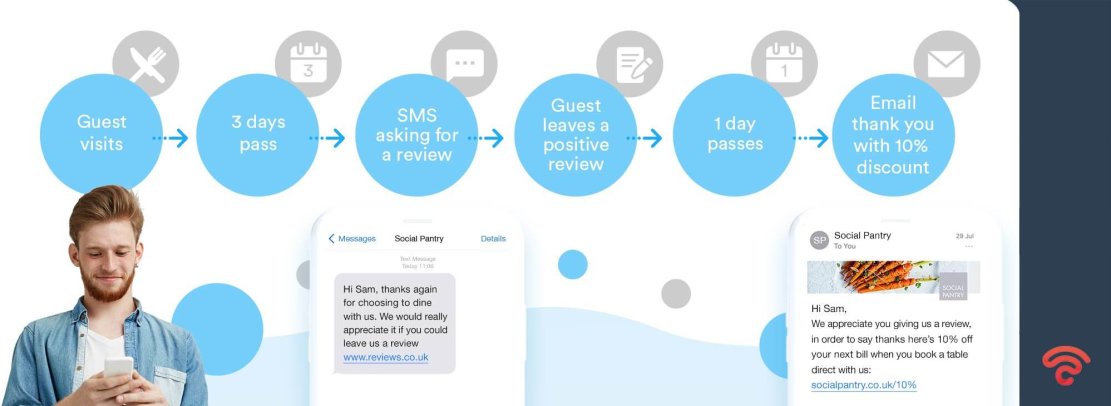Research suggests that behaviour is one of the most common marketing segments used by businesses in the digital economy.
This has fuelled the rise of something called behavioural marketing, which is typically carried out via email and SMS.
It’s proving transformative for hospitality businesses. Despite this, you may not be aware of what behavioural marketing is or how it can directly benefit your own venue.
Here’s the lowdown.
What is behavioural marketing?
 Marketing is all about delivering the right answers at the right time. With behavioural marketing, you can do just that - providing you collect the right data about your potential and existing customers.
Marketing is all about delivering the right answers at the right time. With behavioural marketing, you can do just that - providing you collect the right data about your potential and existing customers.
When you know your target audience’s location, past buying behaviour and interests, you can use that data to fuel a behavioural marketing strategy.
At grass roots, behavioural marketing is all about segmenting a prospect database so that the most relevant marketing messages can be placed in front of the right people at the right time.
How can I obtain that kind of data?
There are several ways to grab the data you’ll need to make behavioural marketing effective.
- Via a lead capture form on your website (i.e. a booking enquiry or free download) - you can ask for more than just their email address, remember!
- Your WiFi system, providing it requires some form of data entry to obtain access
- Cookies and search history, if you’re intending on investing in pay-per-click (PPC) advertising.
- Your reservation or property management system (particularly useful for past buying behaviour).
3 benefits of behavioural marketing
1. It’s highly personalised
Behavioural marketing enables you to nurture new customers into loyal guests by creating a personalised engagement with them, based on the way they interact with your business.
 Food for thought: 50% of people believe they receive too many emails. This is why personalisation makes a difference.
Food for thought: 50% of people believe they receive too many emails. This is why personalisation makes a difference.
2. It gets the timing just right
Old sales and marketing tactics are pretty much dead. These days, it’s all about personalisation (see above) and timing.
Behavioural marketing relies on triggers for email and SMS sends, which are designed to appear in front of your audience’s eyes right when they’re most likely to be engaged (for instance, the day after their booking with you).
 Food for thought: 51% of smartphone users make a purchase from a specific company because the information arrived right at the moment they needed it.
Food for thought: 51% of smartphone users make a purchase from a specific company because the information arrived right at the moment they needed it.
3. It reduces marketing fatigue
It’s far too easy to fall into the trap of sending out pointless marketing campaigns, ‘just because’. In doing so, you’ll get bored and, more importantly, so will your audience (they’ll just delete your emails immediately - if they don’t unsubscribe first).
With behavioural marketing, you’ll only send messages to customers when the time is right (see above). What’s more, they’ll be contextual and seemingly intended for that person only. This eliminates any marketing fatigue you or they might be experiencing.
 Food for thought: 293 billion emails were sent and received EVERY DAY in 2019. Behavioural marketing ensures your messages don’t get lost in that sea of communication.
Food for thought: 293 billion emails were sent and received EVERY DAY in 2019. Behavioural marketing ensures your messages don’t get lost in that sea of communication.
Next steps
To implement behavioural marketing at your venue, start by:
- ensuring your have the tools available to collect the right data, from your WiFi system to reservation portal;
- making a list of the data points you need in order to segment your contact lists for the biggest marketing impact; and
- thinking about your audience as individual groups and defining the offers that will be most impactful for them.
Get Started With Free WiFi Marketing
Beambox helps businesses like yours grow with data capture, marketing automation and reputation management.
Sign up for 30 days free